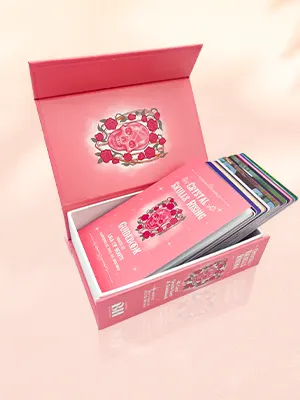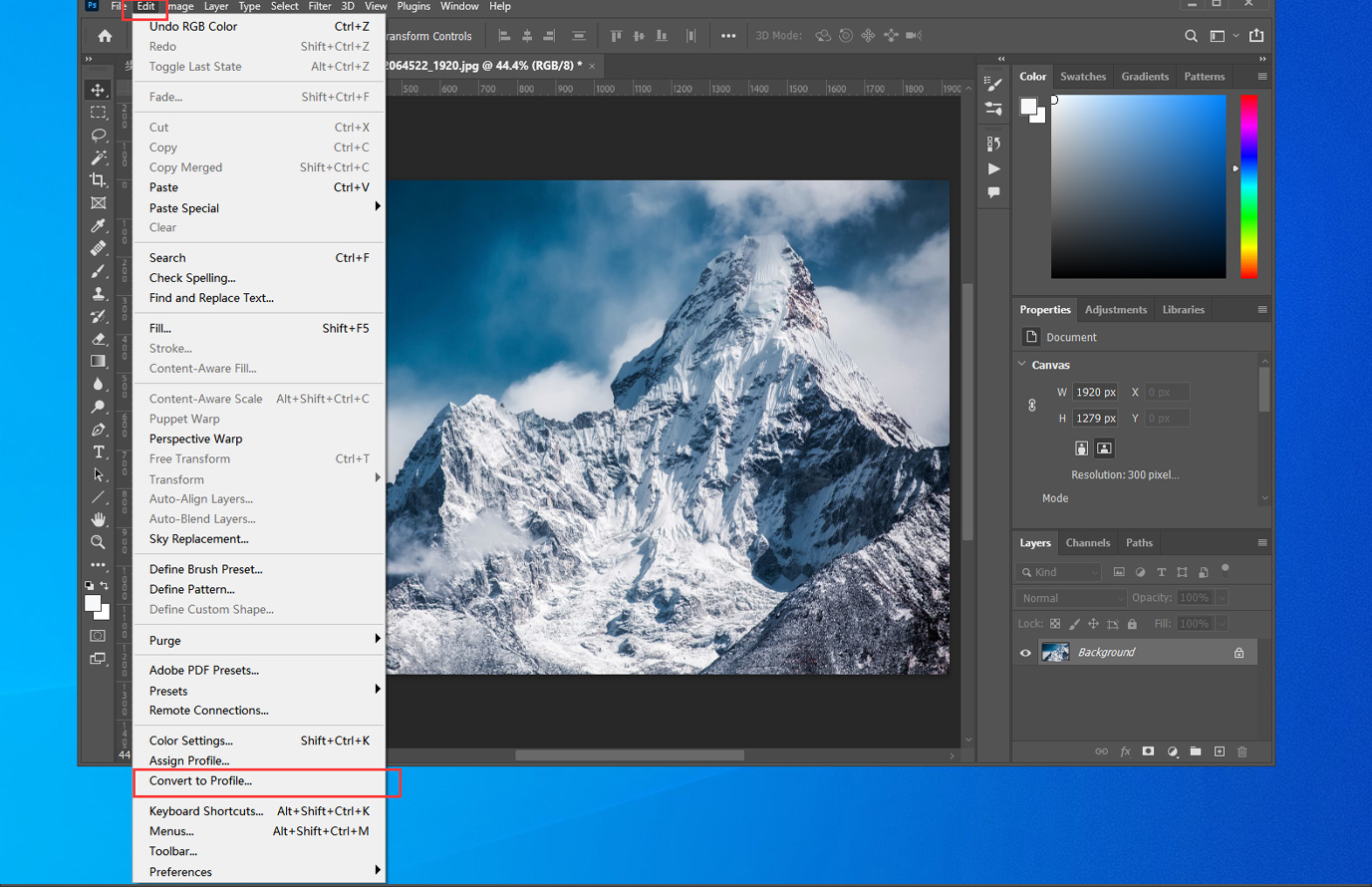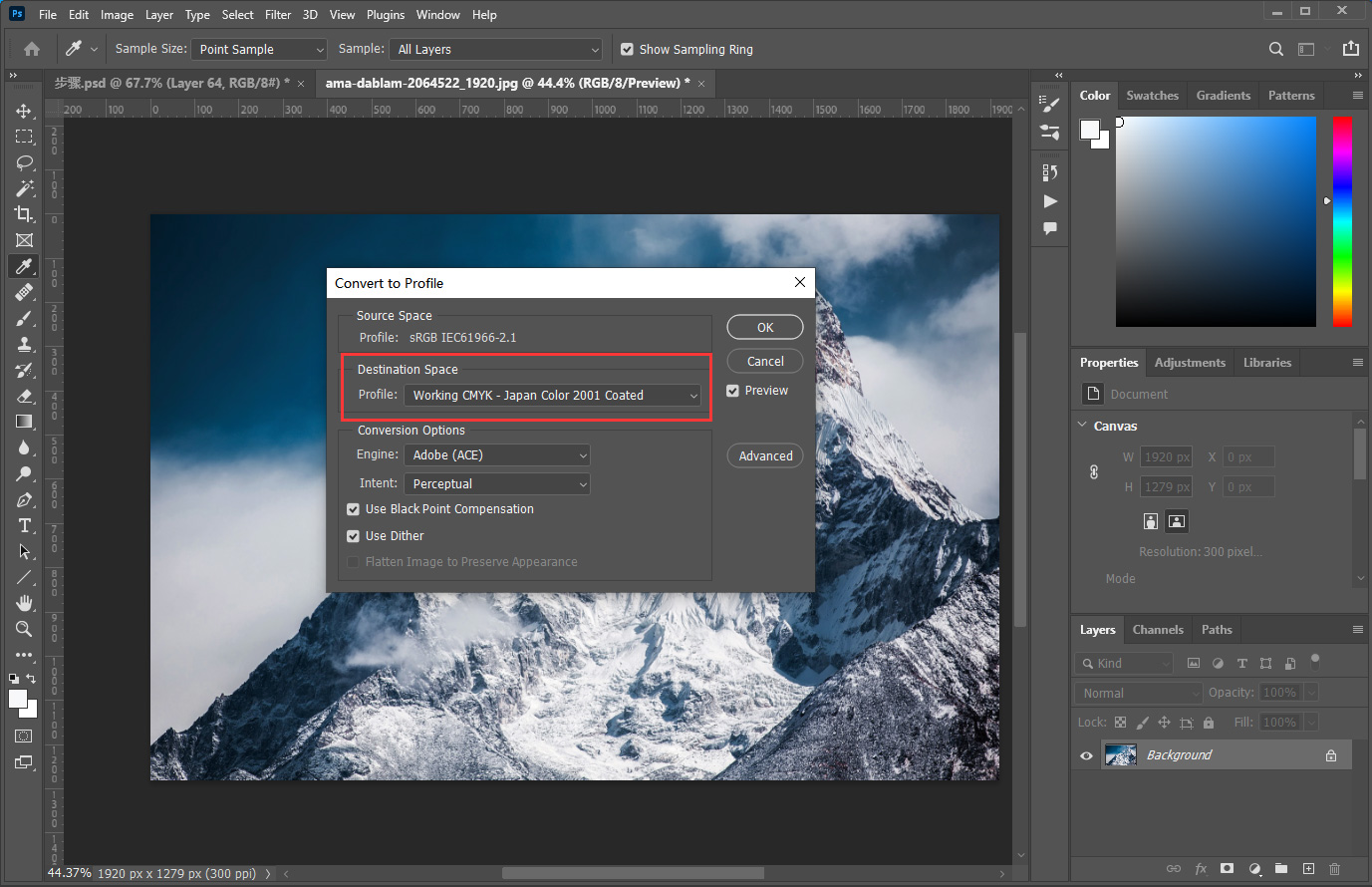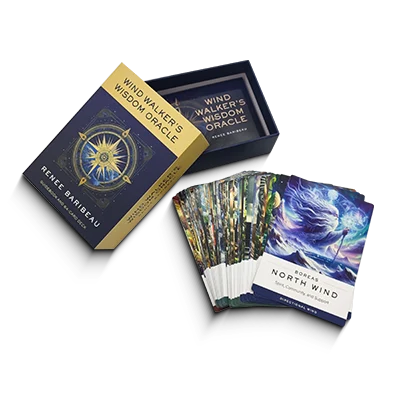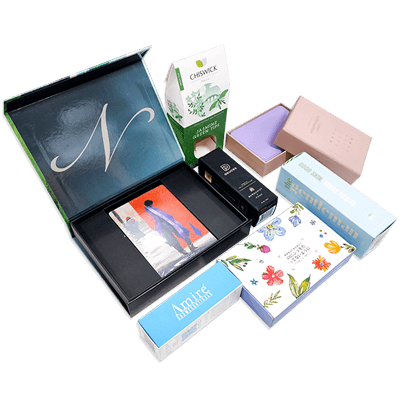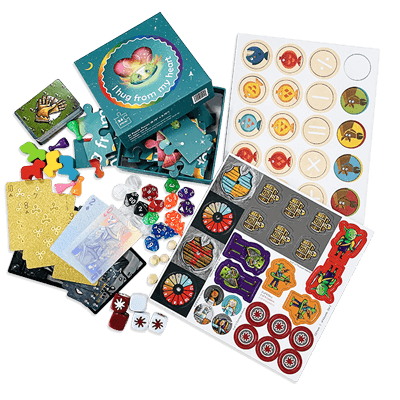CMYK and RGB
We clear up the confusion about the meaning of colour spaces or modes and the differences between RGB, CMYK, and the importance for design and printing.

What Are the CMYK and RGB Colour Spaces?
In brief, CMYK is the colour space or mode most commonly used for printing, while RGB is the colour space or mode designed for use with light-emitting screen displays, such as you have on your computer.
CMYK stands for “Cyan, Magenta, Yellow, and Black”. Black is signified by the letter “K” because it’s the “key colour” in the system. The CMYK colour mode is known as a “subtractive system” because it works by blending pigments which reflect and absorb different light frequencies. So, these are, if you like, “physical colours” made with inks and which can be applied to paper and other materials.
RGB stands for “Red, Green, Blue”. RGB colour mode is an “additive system” because it creates colours by emitting different light frequencies across a visible zone. It’s used for screens—computers, televisions, monitors, etc.—and is composed of tiny light emitting units called “pixels” or “dots”.
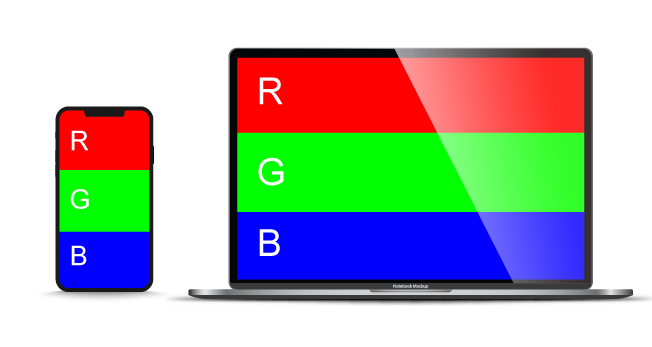
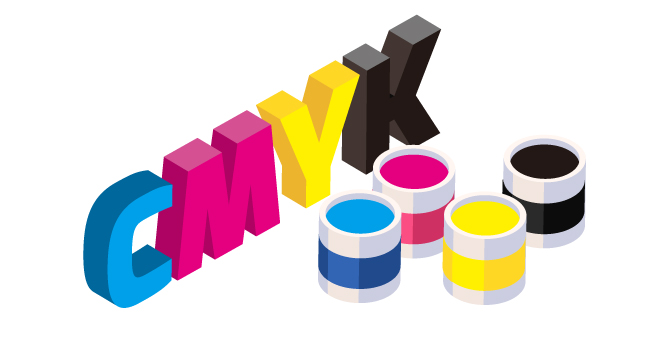
What Is the Difference Between CMYK and RGB?
Both CMYK and RGB are colour systems which allow us to see objects or scenes in varying colours, but CMYK works by subtracting, or absorbing, certain light frequencies from reflected white light (which contains the whole spectrum), whereas RGB adds colours to the visual field by emitting frequencies directly from a light source.
The more colour you add in CMYK mode, the darker the result you achieve. The more colour you add in RGB, the lighter the resulting image will be. While you’re designing images on your computer, you’ll use the RGB colour system by default. But you can’t print light-emitting pixels! So, during processing, a colour image must be converted by separating the elements into CMYK components that are recombined using inks on an offset printing press to achieve the desired print result.
Which Colour Space Do Printers Use?
Offset printing necessarily needs to use a material colour system to print on paper. A printing machine creates images by combining CMYK colours to varying degrees using physical ink. That’s why we use CMYK for printed materials. It’s also why, if you’ve been designing in RGB mode, you’ll need to convert your colour space to CMYK when preparing your files for printing.
How Do You Convert RGB to CMYK?
Before you edit the artwork in any design software—such as InDesign and Illustrator, which we recommend—you need to convert the photos from the RGB format to CMYK.
2. Choose the Profile: Japan Colour 2001 Coated, then click OK.
CMYK is the default colour option in InDesign. But whatever software you choose, it’s best to select the CMYK colour space at the outset and work with it throughout your design process.
If you would prefer, you can send us the original printing files, including all fonts and photos, and we’ll handle the colour conversion for you.
What Happens If You Print Artwork in RGB Colour Mode?
The difference between the colour spaces of RGB and CMYK is vitally important because RGB colours can’t always be accurately reproduced in print. At best, if you tried, you’d get a dull, muddy version of your original and in the worst case, colours may even appear different in print compared to how they did on your screen. So, we strongly recommend that you design in CMYK from the outset.
Why Are Printed Colours Different Than on the Screen?
RGB on the screen, and CMYK in ink on paper, create colour perception by opposite means. So, RGB emits light. That gives it access to the whole “gamut” of possible colours in the visible spectrum. Whereas CMYK creates colour perception by materials (inks) which absorb some frequencies of reflected light. This difference means that some colours simply cannot be reproduced on the page. But, if we convert the colour spaces, we can get very close; so much so, that the viewer can’t tell the difference. But if you reproduce the same image from the screen to ink and paper without converting, the difference is often striking.
Common CMYK Colours Chart
For all the reasons explained above, recreating colours on the printed page is a challenging task and requires skill and professional expertise. But with decades of experience and the continually evolving print technologies we have available; we’ve developed a vast array of reliable colour mixes that work well with offset printing. The chart below shows several CMYK colour matches which will go a long way toward helping you.
CMYK Red

C: 0
M: 100
Y: 0
K: 0

C: 0
M: 90
Y: 0
K: 0

C: 0
M: 80
Y: 0
K: 0

C: 0
M: 70
Y: 0
K: 0

C: 0
M: 60
Y: 0
K: 0

C: 0
M: 50
Y: 0
K: 0

C: 0
M: 40
Y: 0
K: 0

C: 0
M: 30
Y: 0
K: 0

C: 0
M: 20
Y: 0
K: 0

C: 0
M: 10
Y: 0
K: 0

C: 0
M: 100
Y: 100
K: 0

C: 0
M: 90
Y: 80
K: 0

C: 0
M: 80
Y: 70
K: 0

C: 0
M: 70
Y: 60
K: 0

C: 0
M: 60
Y: 50
K: 0

C: 0
M: 50
Y: 40
K: 0

C: 0
M: 40
Y: 30
K: 0

C: 0
M: 30
Y: 20
K: 0

C: 0
M: 20
Y: 10
K: 0

C: 0
M: 10
Y: 5
K: 0

C: 20
M: 100
Y: 0
K: 0

C: 20
M: 90
Y: 0
K: 0

C: 20
M: 80
Y: 0
K: 0

C: 20
M: 70
Y: 0
K: 0

C: 20
M: 60
Y: 0
K: 0

C: 10
M: 50
Y: 0
K: 0

C: 10
M: 40
Y: 0
K: 0

C: 5
M: 30
Y: 0
K: 0

C: 5
M: 20
Y: 0
K: 0

C: 5
M: 10
Y: 0
K: 0

C: 20
M: 100
Y: 100
K: 0

C: 20
M: 90
Y: 80
K: 0

C: 20
M: 80
Y: 60
K: 0

C: 20
M: 70
Y: 40
K: 0

C: 20
M: 60
Y: 30
K: 0

C: 10
M: 50
Y: 20
K: 0

C: 10
M: 40
Y: 10
K: 0

C: 5
M: 30
Y: 5
K: 0

C: 5
M: 20
Y: 5
K: 0

C: 5
M: 10
Y: 5
K: 0
CMYK Blue

C: 100
M: 0
Y: 0
K: 0

C: 90
M: 0
Y: 0
K: 0

C: 80
M: 0
Y: 0
K: 0

C: 70
M: 0
Y: 0
K: 0

C: 60
M: 0
Y: 0
K: 0

C: 50
M: 0
Y: 0
K: 0

C: 40
M: 0
Y: 0
K: 0

C: 30
M: 0
Y: 0
K: 0

C: 20
M: 0
Y: 0
K: 0

C: 10
M: 0
Y: 0
K: 0

C: 100
M: 0
Y: 20
K: 0

C: 90
M: 0
Y: 20
K: 0

C: 80
M: 0
Y: 20
K: 0

C: 70
M: 0
Y: 20
K: 0

C: 60
M: 0
Y: 20
K: 0

C: 50
M: 0
Y: 10
K: 0

C: 40
M: 0
Y: 10
K: 0

C: 30
M: 0
Y: 5
K: 0

C: 20
M: 0
Y: 5
K: 0

C: 15
M: 0
Y: 5
K: 0

C: 100
M: 70
Y: 0
K: 0

C: 90
M: 60
Y: 0
K: 0

C: 80
M: 50
Y: 0
K: 0

C: 70
M: 40
Y: 0
K: 0

C: 60
M: 30
Y: 0
K: 0

C: 50
M: 20
Y: 0
K: 0

C: 40
M: 10
Y: 0
K: 0

C: 30
M: 10
Y: 0
K: 0

C: 20
M: 5
Y: 0
K: 0

C: 10
M: 5
Y: 0
K: 0

C: 100
M: 40
Y: 10
K: 0

C: 100
M: 30
Y: 10
K: 0

C: 80
M: 20
Y: 10
K: 0

C: 80
M: 10
Y: 10
K: 0

C: 60
M: 10
Y: 10
K: 0

C: 60
M: 5
Y: 10
K: 0

C: 50
M: 5
Y: 10
K: 0

C: 40
M: 5
Y: 5
K: 0

C: 30
M: 5
Y: 5
K: 0

C: 20
M: 5
Y: 5
K: 0
CMYK Yellow

C: 0
M: 0
Y: 100
K: 0

C: 0
M: 0
Y: 90
K: 0

C: 0
M: 0
Y: 80
K: 0

C: 0
M: 0
Y: 70
K: 0

C: 0
M: 0
Y: 60
K: 0

C: 0
M: 0
Y: 50
K: 0

C: 0
M: 0
Y: 40
K: 0

C: 0
M: 0
Y: 30
K: 0

C: 0
M: 0
Y: 20
K: 0

C: 0
M: 0
Y: 10
K: 0

C: 0
M: 50
Y: 100
K: 0

C: 0
M: 40
Y: 90
K: 0

C: 0
M: 30
Y: 80
K: 0

C: 0
M: 20
Y: 70
K: 0

C: 0
M: 10
Y: 60
K: 0

C: 0
M: 5
Y: 50
K: 0

C: 0
M: 5
Y: 40
K: 0

C: 0
M: 5
Y: 30
K: 0

C: 0
M: 5
Y: 20
K: 0

C: 0
M: 5
Y: 10
K: 0

C: 5
M: 40
Y: 100
K: 0

C: 5
M: 30
Y: 100
K: 0

C: 5
M: 20
Y: 100
K: 0

C: 5
M: 10
Y: 100
K: 0

C: 5
M: 5
Y: 100
K: 0

C: 5
M: 5
Y: 90
K: 0

C: 5
M: 5
Y: 80
K: 0

C: 5
M: 5
Y: 70
K: 0

C: 5
M: 5
Y: 60
K: 0

C: 5
M: 5
Y: 50
K: 0
CMYK Green

C: 100
M: 0
Y: 100
K: 0

C: 90
M: 0
Y: 90
K: 0

C: 80
M: 0
Y: 80
K: 0

C: 70
M: 0
Y: 70
K: 0

C: 60
M: 0
Y: 60
K: 0

C: 50
M: 0
Y: 50
K: 0

C: 40
M: 0
Y: 40
K: 0

C: 30
M: 0
Y: 30
K: 0

C: 20
M: 0
Y: 20
K: 0

C: 10
M: 0
Y: 10
K: 0

C: 100
M: 0
Y: 80
K: 0

C: 90
M: 0
Y: 70
K: 0

C: 80
M: 0
Y: 60
K: 0

C: 70
M: 0
Y: 50
K: 0

C: 60
M: 0
Y: 40
K: 0

C: 50
M: 0
Y: 30
K: 0

C: 40
M: 0
Y: 20
K: 0

C: 30
M: 0
Y: 15
K: 0

C: 20
M: 0
Y: 10
K: 0

C: 10
M: 0
Y: 5
K: 0

C: 80
M: 0
Y: 100
K: 0

C: 70
M: 0
Y: 90
K: 0

C: 60
M: 0
Y: 80
K: 0

C: 50
M: 0
Y: 70
K: 0

C: 40
M: 0
Y: 60
K: 0

C: 30
M: 0
Y: 50
K: 0

C: 20
M: 0
Y: 40
K: 0

C: 15
M: 0
Y: 30
K: 0

C: 10
M: 0
Y: 20
K: 0

C: 5
M: 0
Y: 10
K: 0

C: 100
M: 40
Y: 100
K: 0

C: 90
M: 40
Y: 90
K: 0

C: 80
M: 30
Y: 80
K: 0

C: 70
M: 30
Y: 70
K: 0

C: 60
M: 20
Y: 60
K: 0

C: 50
M: 20
Y: 50
K: 0

C: 40
M: 10
Y: 40
K: 0

C: 30
M: 10
Y: 30
K: 0

C: 20
M: 5
Y: 20
K: 0

C: 10
M: 5
Y: 10
K: 0
CMYK Black

C: 0
M: 0
Y: 0
K: 100

C: 0
M: 0
Y: 0
K: 90

C: 0
M: 0
Y: 0
K: 80

C: 0
M: 0
Y: 0
K: 70

C: 0
M: 0
Y: 0
K: 60

C: 0
M: 0
Y: 0
K: 50

C: 0
M: 0
Y: 0
K: 40

C: 0
M: 0
Y: 0
K: 30

C: 0
M: 0
Y: 0
K: 20

C: 0
M: 0
Y: 0
K: 10

C: 30
M: 30
Y: 30
K: 100

C: 30
M: 30
Y: 30
K: 90

C: 25
M: 25
Y: 25
K: 80

C: 25
M: 25
Y: 25
K: 70

C: 20
M: 20
Y: 20
K: 60

C: 20
M: 20
Y: 20
K: 50

C: 15
M: 15
Y: 15
K: 40

C: 15
M: 15
Y: 15
K: 30

C: 5
M: 5
Y: 5
K: 20

C: 5
M: 5
Y: 5
K: 10
Need More Help? Talk to Us!
All these facts about colour spaces need to be kept in mind before designing your print materials. At QinPrinting, we pride ourselves on our first-class customer service and design support. If you have any further questions about RGB and CMYK colour modes and conversion or other prepress issues, we’ve made it super-easy for you to get in touch with our expert design team by telephone, via email, Skype, the chat box, or the contact form. Talk to us!

